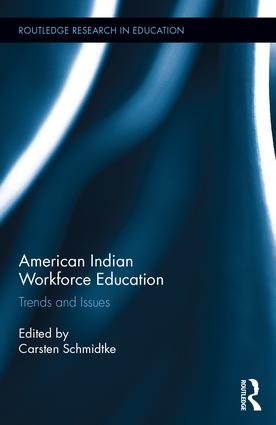A new collection of essays edited by a University of Arkansas professor is a first of its kind, establishing a baseline of the current state of American Indian workforce education.
Carsten Schmidtke is an assistant professor who teaches in the human resource and workforce development program. He joined the faculty of the College of Education and Health Professions in 2008.
American Indian Workforce Education: Trends and Issues was published recently by Routledge Research in Education. The book is an outgrowth of Schmidtke's dissertation research. He previously taught at the Oklahoma State University Institute of Technology at Okmulgee, where about 20 percent of the enrollment was Native American students.
When he started developing the book proposal, Schmidtke found little up-to-date information on American Indian workforce education.
"We really needed something that examines the current state of American Indian workforce education," Schmidtke said, "because we need to think about programs that can help support sovereignty and community development."
The book establishes a baseline with information on issues, opportunities, problems, successes and challenges. It may be useful in developing workforce education programs that work for tribes, he said.
"It describes what we have to work with now and which parts are missing," Schmidtke said. "As experts in the field, we can assist tribal leaders in connecting their needs with what colleges have to offer."
However, educators have to be mindful of historical issues that may have made Native Americans skeptical about government programs.
"As consultants, we should not be running their programs," Schmidtke said. "We should always expect skepticism and be open and not try to push people into something they don't want to do."
Schmidtke wrote the introduction and conclusion to the book and one of the nine chapters in the book, titled "Career Development Counseling for American Indian Students." He reviews approaches that professionals can use to provide culturally sensitive and useful advice to American Indian students trying to decide on a career path.
The book is aimed at graduate students and other scholars interested in the field.
It begins with an overview of what vocational or workforce education has historically been like for American Indians and a discussion of how this history shapes negative perceptions today. Other authors cover challenges faced by American Indians interested in obtaining skills for better employment and how these challenges influence choices made about education, tying vocational education of the past to the role of tribal colleges in overcoming injustices and inequality, the role of tribal colleges in ensuring workforce education is available to all American Indians, and the link between workforce education, economic development, tribal sovereignty, and tribal educational control.
Wrapping up the book are chapters on other educational institutions, the need for sensitivity toward American Indian culture by educators, a look at the specific life circumstances and experiences of young men as they search for work and a career, and the challenges of training enough workers to serve the health-care needs of tribes and American Indian communities.
Contacts
Heidi S. Wells, director of communications
College of Education and Health Professions
479-575-3138,
